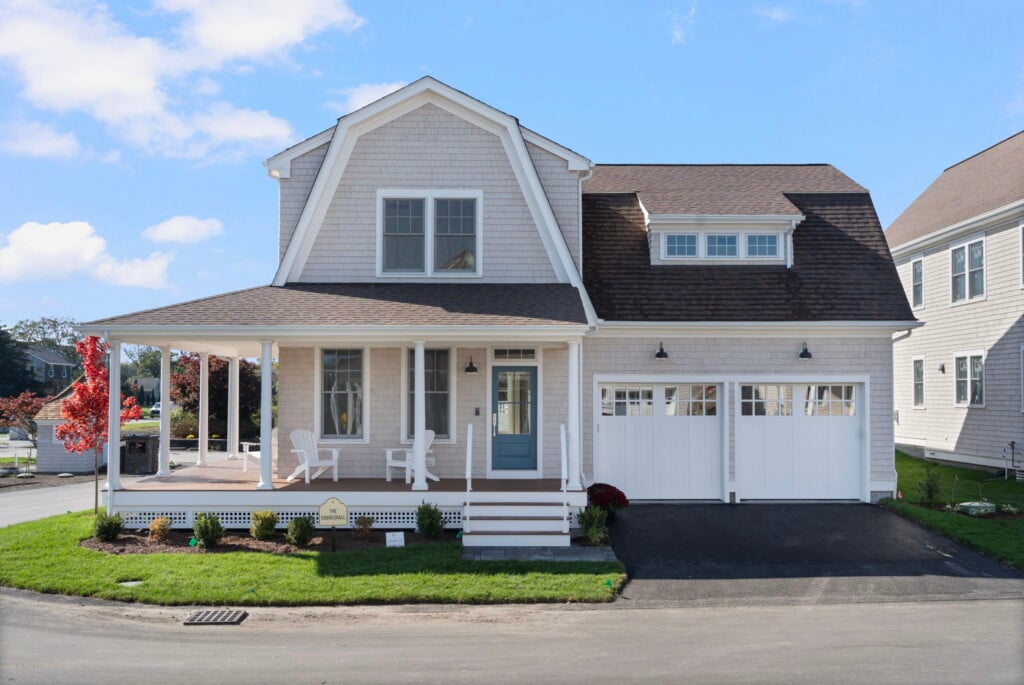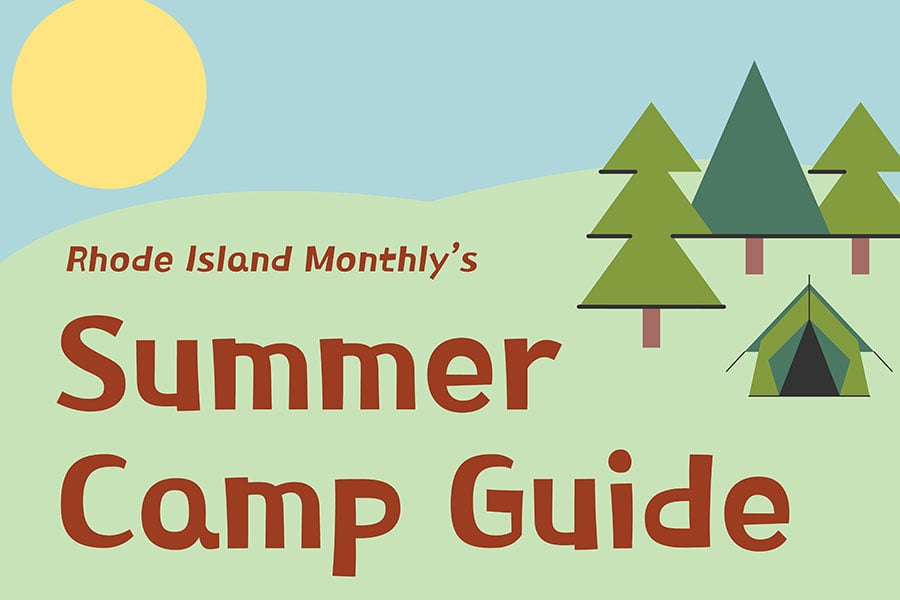Q&A: Weayonnoh Nelson-Davies, Head of the Economic Progress Institute, Talks Rhode Islanders’ Biggest Challenge and More
As a teenager, the lawyer-turned-advocate fled civil war in her home country. Now she fights for the state's most vulnerable residents.
Weayonnoh Nelson-Davies’ career has not followed a conventional path. Born in Liberia, the North Providence resident immigrated to Rhode Island in 1996 in the midst of her home country’s devastating civil war. As a teenager, she dreamed of using her voice to help others, later embarking on a career as a legal aid attorney in Massachusetts.
Today, she heads the Economic Progress Institute, a nonprofit research and policy organization dedicated to improving the economic well-being of low- and modest-income Rhode Islanders. The first woman of color to head the organization, Nelson-Davies took on the position last year, shortly before the retirement of longtime policy director and co-founder Linda Katz. Here, she shares her priorities for the future and reflects on the steps that led to her role today.
Can you tell us a little bit about the Economic Progress Institute? We were founded in 1999, and we were called the Poverty Institute then. Right here at Rhode Island College, so we’ve been here for almost twenty-five years. And we were founded by the late Nancy Gewirtz, who was a professor of social work, and Linda Katz, who was a legal aid attorney. It was founded really to respond to the 1996 welfare reform that created a lot of barriers for children and their families. After that, Linda and Nancy got together to push for policies at the state level. They realized worker voices are not heard as well and there was a void when it came to tax and budget policies around low- and modest-income Rhode Islanders, so they decided the Poverty Institute should fill that void. In 2012, we decided to rebrand from what we were fighting against — poverty — to what we were fighting toward — economic progress.
You’re originally from Liberia. How did you end up in Rhode Island? I was born in Liberia. And when I turned ten years old, a week after, we went through a civil war. And that civil war for me changed my perspective on life. I wanted to be a teacher before the war. [I was] very shy. I always had a deep voice as a little girl and didn’t like to speak up because I got teased because my voice was so deep. And then the war happened. For me, the war probably will be the most traumatic experience I’ve ever had. I was a child and I experienced death, destruction. I never felt as hungry as I felt during the war, and then also this powerlessness that there was nothing we could do. We didn’t have any say in whether we lived or died, or whether the war would end. And that powerlessness stuck with me. And I was like, ‘Why? Why should we be powerless about things that affect our life as children, as innocent women and innocent citizens, when we had nothing to do with the war?’ And so I started advocating as a young person in the midst of the war first with child soldiers, saying, ‘You’re pulling children to fight your war, you’re drugging them to do unspeakable things, and that’s wrong.’ I don’t know where that courage came from, but it was something I felt like if I survive, I should speak up for the kind of future we want.
In 1996, the war escalated and my father made a decision. I had my nephew who was an American citizen. He was eleven months [old] and was living in Liberia at that time while his mom was [in the United States] getting her master’s degree. My father made a decision: As one of the youngest members of a very large family, I would bring my nephew to the United States. And so I made a journey at the age of sixteen with my baby nephew. My sister lived in Rhode Island, and I came here to live with her. That’s how I ended up in Rhode Island, and Rhode Island has been my home state for about twenty-seven years now.
I graduated high school, was on a temporary immigration status, had no idea whether I was going to go to college or not, and I joined City Year Rhode Island right after high school. I think for me that was another shift because I was homesick for the year, confused about what my future was going to be in this new land, and City Year for me as a young person reminded me that yes, I’m going to be an attorney. These were young people gathered together in an AmeriCorps program saying, ‘We are the future and we’re going to advocate and we’re going to push for empowerment of our communities.’ And I think that’s where my energy, like, ‘I can survive this and I can be in this,’ sort of started. The educational award I got led me to Rhode Island College where I graduated, because that was the only state college I could afford. After that, Roger Williams Law School became my law school that made my dream of being a public interest attorney come true.
What exactly is a legal aid attorney? In the United States, under criminal law, everyone has a right to an attorney. Under civil law you do not. So if you’re getting evicted, if you’re a victim of domestic
violence trying to leave an abusive relationship, if you want access to benefits and you’re denied, if you apply to an immigration court and you’re denied, you do not have a right to an attorney. Legal aid organizations are basically creating access to justice for poor communities to give them the right to an attorney.
How does that experience inform the work you do now? In legal aid, from the very beginning, I represented the same clients over and over again. They kept getting evicted because they couldn’t afford their rent. Or they would get in situations where they didn’t have any opportunities so they kept applying for benefits, but the cycle of poverty didn’t end. I saw firsthand that my clients have access to justice, they have someone who can represent them, but the things that created the cycle of poverty aren’t going away. If the policy’s not changed, my clients’ lives do not change. They change for a moment because I’m there, and other legal aid attorneys are there, but the system itself has not changed. All of that has really informed me to understand how systems interact, how policies create these systems and what policies we need to change for the betterment of low-income communities.
What are some of EPI’s big priorities as we head into the next legislative session? We have a few. One is equity. We’ve pushed for an equity review of the way we set our budget and policies. There continue to be gaps and disparities between economic security among our different communities. It’s important for us for when we set the budget and policies to really think about how those policies are impacting communities differently. And what policies we need to prevent further harm.
The other piece, now that we are no longer going to get some of the federal funding we got from the pandemic, is back to one of our main priorities: tax fairness. Lowest-income Rhode Islanders pay more in taxes when you add personal and poverty taxes than the richest Rhode Islanders. That’s a fairness and an equity issue. We’re hoping now that we need revenue to provide those vital public services, we are thinking of it in an equitable way — who’s paying taxes, and how much revenue can we generate if we do it fairly?
One that we got momentum on last year that I’m hoping we can get through this year is payday lending reform. It’s a system where, again, low-income Rhode Islanders and communities of color are targeted and there’s a carveout in our statute that allows payday lenders to add interest rates that can go up to 260 percent for low-income Rhode Islanders. We’re hoping to have reform to make sure that they cannot charge more than other financial institutions can charge when it comes to interest rates.
What do you think is the biggest challenge facing Rhode Islanders today? If I think about how all the multidimensional issues that we deal with, where they intersect, it would be cost of living. Based on the [Rhode Island Standard of Need] report we just did last year, the biggest challenge is Rhode Islanders cannot meet their basic needs. And that intersects with housing, with child care, with food insecurity and health care. What we saw was 70 percent of single-parent households, working adults, cannot meet their basic needs. Sixty-one percent of single adults without children cannot meet their basic needs in Rhode Island, and 25 percent of two-parent households cannot meet their basic needs. For me the fact that people are working and still not able to afford housing and child care and food is really important.
Based on your experience, how does Rhode Island compare to the rest of the country on these issues? I don’t think we’re different. I think what’s unique is how other states have progressed on certain issues and where we have missed certain opportunities. We’re small enough to really make some bold moves that can impact the entire state. We’re set up for transformation and change. I think we have not pushed as much as we could. For example, paid leave. Rhode Island was one of the leaders in the country with setting up a paid leave system where workers get six weeks off and also get wage replacement. We have lagged behind where now we have one of the worst paid leave programs because we’re only providing six weeks and 60 percent wage replacement where other states have caught up and passed us. Our neighbors, for example, are providing people with 80 to 95 percent of their wages when they go on paid leave up to twelve weeks.
If you had $100 million to spend in Rhode Island, where would you invest it? I would spend it on neighborhood trusts. Policy without people is one of the reasons why we fail because we didn’t go to people for the solution. We recommended $50 million in the Make It Happen report [developed in 2021 with a coalition of partners], and I would like to spend that $50 million investing in a neighborhood trust where communities can sit down and say, ‘This is what we need.’ The reason that’s important is because poverty is place-based. If we think poverty is concentrated in this neighborhood, let’s look to the neighborhood to decide why it’s there and what they can do about it. I think investing in nonprofits is also important because they do sit in the gap when our government is not doing what they need to do, and communities are coming to them first to say, ‘This is what we need.’ Lastly, it’s an area where historically EPI has not advocated [except] in the last few years. Most people are criminalized because they are poor. And so spending that money for something like getting rid of fines and fees debt and also reform I think is important because you really eliminate a cycle of debt that puts people in poverty and give them the opportunity to move forward.
What keeps you motivated when the work is frustrating? I remember the why. I focus on the people I do this work for to make sure they get the access they need, they get the respect and dignity they need, and they get what they need to really be able to survive and thrive and enjoy life as it was meant to be enjoyed.
What is your favorite place in Rhode Island? Kennedy Plaza. When I graduated high school and I became an AmeriCorps member with City Year Rhode Island, we used to meet at Kennedy Plaza every morning in our red jackets and Timberland boots and I used to lead PT — physical training. In the morning, we had to do exercises, screaming at the top of our lungs while people were trying to catch their buses, and get energized to do civic engagement as young people. It was where I found myself again after being homesick and anxious about life. It was one year after I immigrated to the United States. I was losing hope. I felt like Kennedy Plaza, in those red jackets and Timberland boots, was where I found myself again.
___________________
This interview has been edited for length and clarity.

























